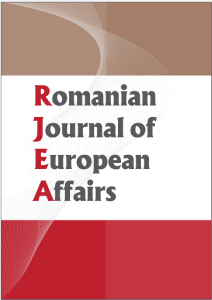Ediția de vară a revistei academice Romanian Journal of European Affairs propune cititorilor săi următoarele teme de cercetare: amenințările hibride în Balcanii de Vest, puterea geopolitică a Uniunii Europene, alfabetizarea financiară în statele membre UE, proiectul monedei digitale euro, redefinirea orașului inteligent, reforma uniunii economice și monetare, suveranitatea digitală europeană.
Hybrid Threats in the Western Balkans: A Case Study of Bosnia and Herzegovina
Martin Solik, Jan Graf, Vladimir Baar
Abstract
The aim of this paper was to identify the nature of hybrid threats posed by Russia in Bosnia and Herzegovina and, subsequently, to identify to what extent the Kremlin is successful in destabilising the political situation in this country. For this purpose, disciplined interpretative case study was employed. This study is primarily based on four expert interviews which were conducted in August 2021, in Sarajevo. The theoretical part of this study introduces the concept of hybrid threats. This concept is then applied to the case of Bosnia and Herzegovina. Based on a comprehensive analysis, the authors were able to identify three areas where the Kremlin’s hybrid threats are the most significant. These are political and economic influence, information space and proxy organizations. This paper may contribute to the understanding of how Russia constructs its hybrid threats and may also lead to further research on hybrid threats in the Western Balkans.
Cuvinte cheie: Bosnia and Herzegovina, Republika Srpska, Russian Federation, hybrid threats, hybrid war.
The Geopolitical Power of EU in the Making (?): A Question of the War in Ukraine
Oana–Antonia Colibășanu
Abstract
This paper looks at the way the European Union has shifted its policymaking process to adapt to the crisis situation in Ukraine and how this serves the EU’s goal of increasing its geopolitical power, becoming a global geopolitical actor. Looking at the specific geopolitical dimensions, the paper argues that the EU has upgraded its geopolitical posture, through cohesive policies taken against the aggressor. Following close monitoring of the EU working sessions and the flow of news, and considering focused interviews on the future of the EU, given the current events, this research brings forth two main scenarios for the EU, commenting on the potential risks for the bloc’s unity considering the Russian aggression in Ukraine and beyond.
Cuvinte cheie: geopolitical dimensions, EU cohesion, Russian threat.
Financial Literacy, Economic Development and Financial Development: A Cross-Country Analysis
Dorina Clichici, Simona Moagăr-Poladian
Abstract
An adequate level of basic financial knowledge of the population contributes to achieving individual well-being, ensuring the stability of financial markets, and proper functioning of the economy. This paper aims to identify Romania’s position on financial literacy indicators, compared to other European countries, and to investigate the link between financial literacy, economic development, and financial development at a cross-country level. The findings reveal that Romania has the lowest level of financial literacy, although its income per capita is not the lowest in the European Union (EU). The low financial inclusion in Romania is strongly linked to inadequate financial education. Moreover, the population underestimates the benefits of long-term savings. These results challenge Romanian policymakers to develop effective financial education tools and programs, aimed at increasing financial awareness and financial literacy of population.
Cuvinte cheie: financial literacy, economic development, financial development, Romania, European Union.
Clasificare JEL: G50, G53, I28.
The Digital Euro Project. A Preliminary Assessment
Iulia Monica Oehler-Şincai
Abstract
The decrease in physical cash usage, the excessive market power of BigTech companies, the largely unregulated market of crypto assets which poses risks to financial stability, as well as the need for more financial inclusion and for lower-cost crossborder payments are just as many arguments in favour of a central bank digital currency (CBDC). However, there are as many points urging caution. In this context, the purpose of the present paper is to analyse the specificity of the potential digital euro as part of the international payments’ architecture. The European Central Bank (ECB) is focusing on the digital euro project, running the investigation phase until October 2023. The debate on the digital euro adoption is in line with the international one, but there are several distinctive aspects. Various scenarios are taken into account, starting from general principles for retail CBDCs, results of the public consultation of a digital euro, experts’ opinions regarding privacy, security, usability, costs, offline use, acceptance, potential disintermediation, standards and international implications of the digital euro. The research also outlines the relations between major actors involved, while identifying the prerequisites for a swift functioning of the Eurozone payment system with digital euro at its core.
Cuvinte cheie: digital currencies, central bank digital currency, digital euro.
Clasificare JEL: E42, E51, E52, E58, F33, O33.
Redefining the Smart City within the European Digital Society
Mirela Mărcuţ
Abstract
Based on the understanding that the EU is building a value-based digital society, this research aims to recapture the narrative of the smart city and to introduce the latter as an actor in EU digital policy. It starts from the acknowledgement that smart cities are reduced to mere business-led strategies and lack direct grassroots engagement that would bring value to the urban landscape. Then, it deconstructs the main pillars of the digital society as proposed by the current Commission and searches for areas of congruence between smart cities and the model for the digital society. To illustrate this congruence, the article analyses policy documents at the European and local level and features a case study of Darmstadt, designated Germany’s Digital City in 2019.
Cuvinte cheie: European Union, digital policy, digital society, smart city, governance.
Responsibility Versus Solidarity? Key Issues for the EMU Reform
Peter Halmai
Abstract
The 2008 economic recession, followed by the sovereign debt crisis, made it clear that the original design of EMU was unsustainable. Together with the most urgent adjustments, the need for a profound reform of the system has been on the agenda for more than a decade. Despite significant steps being taken, no comprehensive reform has yet been delivered. In this paper, the background and the focus of the EMU reform will be reviewed. The research argues that it is necessary to create a better balance between the common shock absorption instruments (i.e., risk sharing) and to give a greater role for markets as incentives for fiscal and financial discipline (i.e., risk reduction). A new synthesis of the two dominant narratives could form the conceptual core of EMU reform. In this way, the need to create a sustainable system of resilience (the ability to respond and adapt) can be the decisive factor. At the heart of the EMU reform there can be deeper economic and financial union, resilient structures, the increase of risk sharing and the reduction of inherited risk.
Cuvinte cheie: EMU, deepening, risk reduction, risk sharing, responsibility of member states, solidarity, resilience, fiscal union, reform package.
Clasificare JEL: F02, F15, F17, F43, F55.
European Digital Sovereignty: An Analysis of Authority Delegation
Cosmina Moghior
Abstract
The European Commission defines the concept of European digital sovereignty as the capacity to make “autonomous technological choices” and the ambition to shape rules and standards at the international level. The idea of “digital sovereignty” responds to the demands of the European public and private sectors to increase the uptake of indigenous technology. However, neither the official policy and discourses, nor the academic literature analyse the actors involved and the power distribution within this process. This article aims to investigate on what is digital sovereignty and who is the “owner” of this new type of sovereignty and the impact of this rhetoric on European integration. It does that by engaging the theoretic lenses of principal-agent framework, drawing on the development path of the European policymaking in the technological area, from the 1980’s until today. The paper concludes that the heterogenous preferences of the member states create the impetus to delegate powers to the European Commission. Furthermore, digital sovereignty rhetoric helps overcome the problems of delegation politics by building coalitions and consensus.
Cuvinte cheie: European digital sovereignty, principal-agent theory, historical analysis, EU institutional architecture, digital policy.






